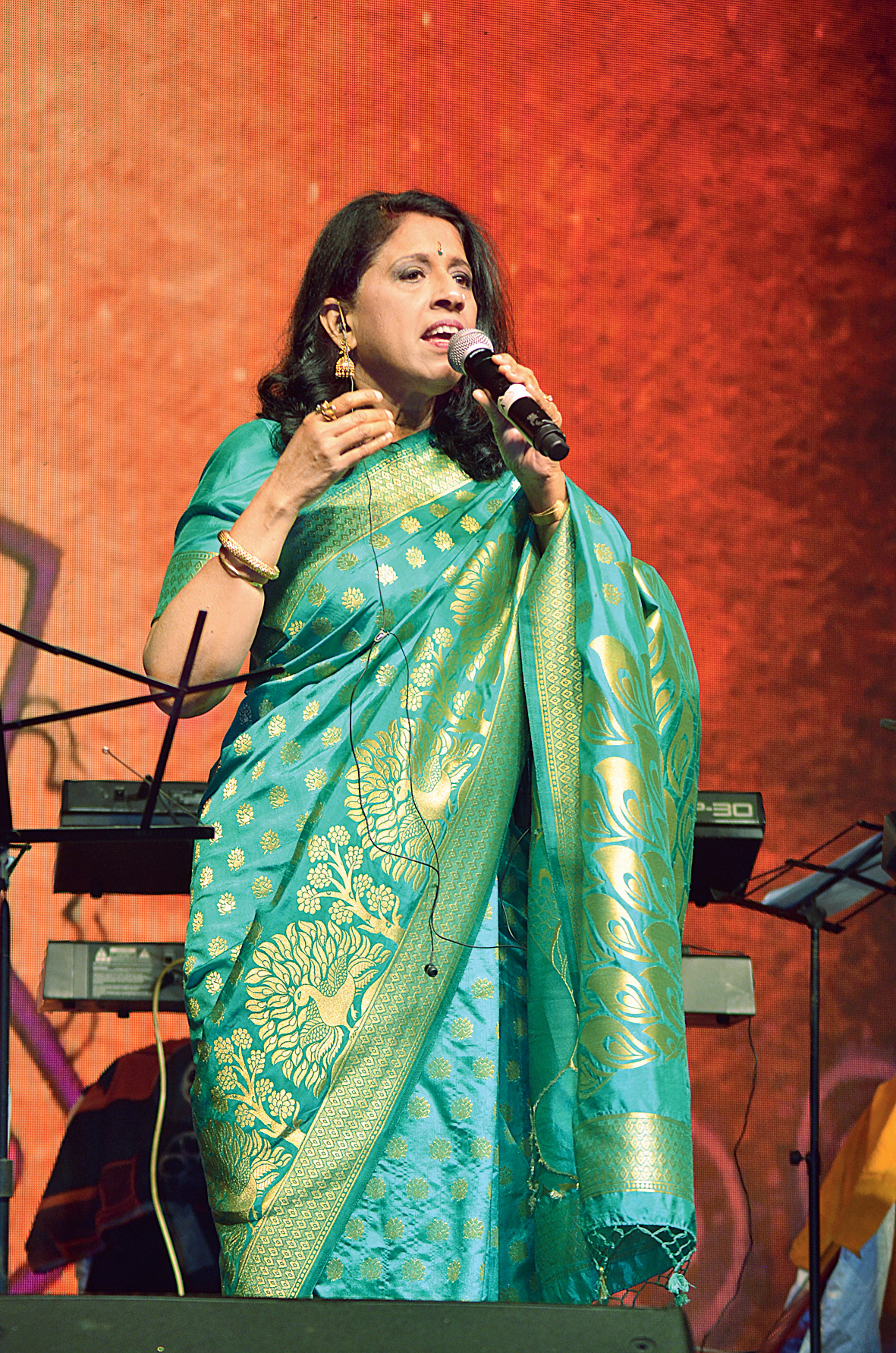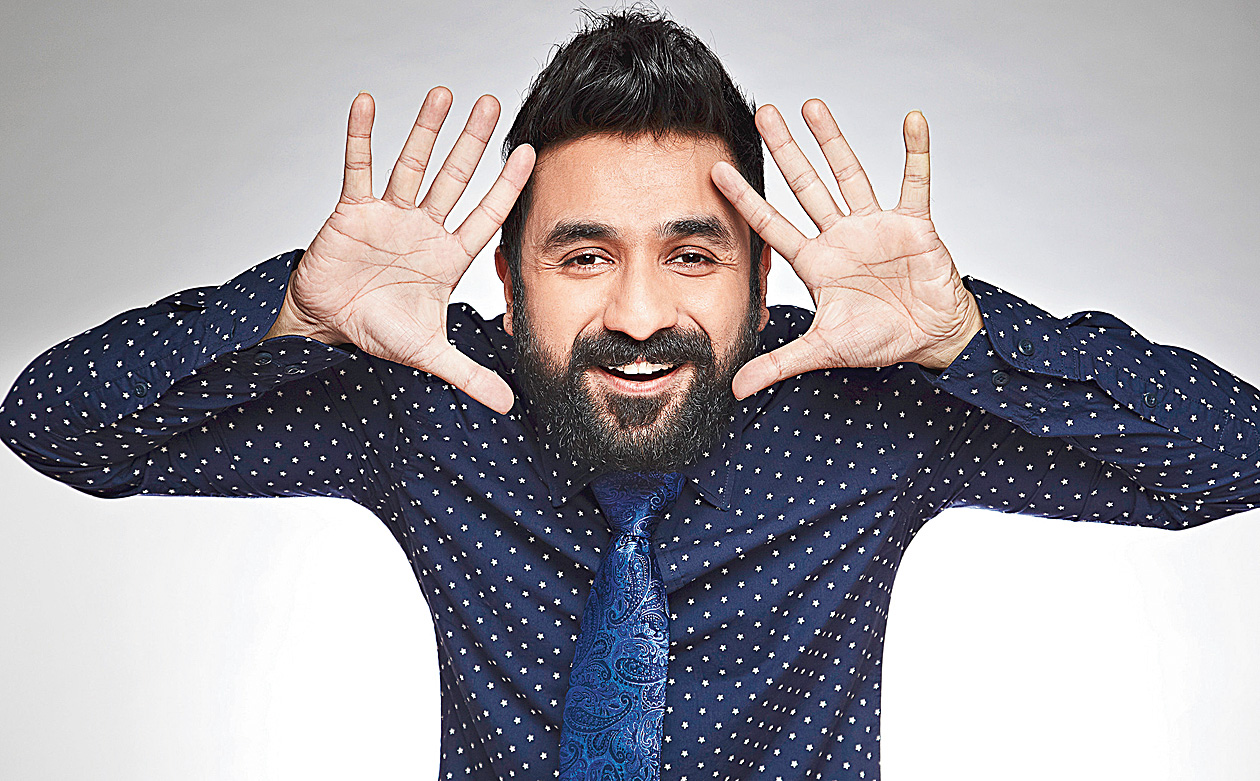She has made a huge contribution to playback singing in Hindi and regional films from mid-70s to mid-2000s, delivering one chartbuster after another. And last month, Calcutta got to hear Kavita Krishnamurthy live at Chandrakosh, presented by Club Verde Vista by Conclave in association with t2. Post-concert, Krishnamurthy looked back at her journey in a phone chat...
What happened to the fabulous era of female brigade in playback singing comprising you, Alka Yagnik, Anuradha Paudwal and Sadhana Sargam?
It’s not that we do not think about it regularly but the music directors who gave us all those breaks and lovely songs are no longer in the circuit and have either passed away or retired gracefully. I miss the likes of Laxmikant-Pyarelal, Viju Shah, R.D. Burman, Anand-Milind, Jatin-Lalit and Nadeem-Shravan.
Most of us still retain our voices and do regular riyaz. I am told the current lot of music directors record the same song with six singers and then decide to either take one (of the versions) or sing it themselves. God, I would never agree to such terms. You either trust me or you don’t.
But there were a lot of dubbing issues in your time as well?
I agree that it started when music companies like T-Series and Tips came in but I refused to dub songs by other singers. By mistake, I once went to a studio and was asked to record. I heard the voice of another female singer on the headphones. Immediately I refused and left the studio.
I have done the scratch for a few singers but that was (done) knowingly. Interestingly, Lata Mangeshkar heard a song I had recorded for Bappi Lahiri and refused to dub saying I had done a good job. Later, at the producer’s insistence, the music director got it dubbed by Ashaji. In many such instances, producers would demand popular singers but the music directors of yore, like O.P. Nayyar or Pyareji, would not budge. If outsiders intervened in the music, many of them would simply walk away. Those were really good people. I am happy I met them and have worked with all of them.
So why are the new singers not protesting the trend?
I guess they are young and not powerful enough to protest. They are all very talented though. In fact, the whole excitement of live recording is gone. I feel the computer software has robbed the magic of the singers’ original voices and most songs now sound clinical. Sometimes I feel the auto- pitch correction is not needed. Let it be. Singers like Shreya Ghoshal, Arijit Singh and Sunidhi Chauhan are so good that they don’t really need such corrections. I guess the audience taste too has changed. Excellence is no longer a criterion. But Bengal has always been very different; I love singing here.
You have a strong Bengal connect, thanks to your two initial mentors Hemanta Mukhopadhyay and Manna Dey…
Of course, did any of them need auto-pitch correction? They were so versatile. Hemantda gave me my first playback in Shriman Prithviraj where I sang with Lataji. What a recording that was. Manna da scored the music for two Bengali adhunik songs that I have sung — Ei palasher deshe and Jakhan takhan — and I believe they are still played on radio. Hemantda’s daughter (Ranu) was my friend in St. Xavier’s (Mumbai). She herself was a good singer but did not want to kowtow to music directors to take her. She introduced me to Gautam Mukherjee who helped me hone my voice differently. Bengal’s listeners are very sharp and discerning. They really love music and not cacophony.
Was there a lot of rivalry in your times?
Even if there was, it did not show so much as we all got our share of songs. I am in touch with most of my contemporaries. We are all waiting to meet at Alka Yagnik’s daughter’s (Syesha Kapoor) wedding soon. We all miss Mohd Aziz (who passed away on November 27) who was such a gentleman and a good singer. I had sung so many duets with him. Suresh (Wadkar) and Hariharan are still very friendly with me. We have our own WhatsApp group and we are in touch with one another.
How was your relationship with senior singers?
Lataji has always praised and encouraged me. I had done the scratch for her in the haunting number Shabnam ka yeh qatra for the film Sharara. Though she eventually sang it, she heard the track and said: ‘Beautifully sung’.
Do you miss playback singing?
Yes, I do at times. Have you realised prayer songs, like my own Om namah shivay from (the film) Bhairavi, have gone out of films? Lyrics like Anand Bakshi’s Kuch to log kahenge... where are such things being written? I am always the hopeless romantic and have a musical mind that refuses to budge from good music. Recently, I was watching an Irrfan Khan film where he is serenading a girl on the train. There are no songs. And I was wondering how nice it would have been if there was a song playing in the background while this train journey is on!
I see films like Sujata and I am in tears when Sunil Dutt lip syncs Jalte hain jiske liye. Now I have moved to newer stuff and doing other collaborative work with London Symphony Orchestra and its ilk. I’ve recorded songs, from the Vedic to current era, for Bharat Symphony and we take this music all over the world to places like the US, Latvia and Brazil. I am more than happy and satisfied with this kind of work.


